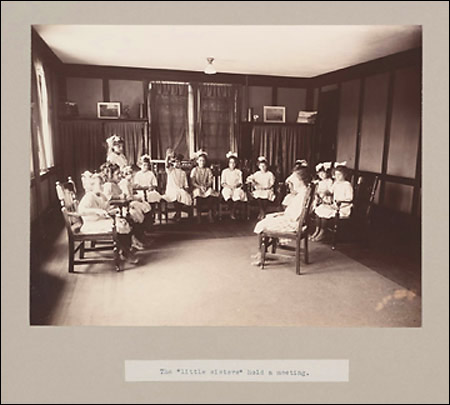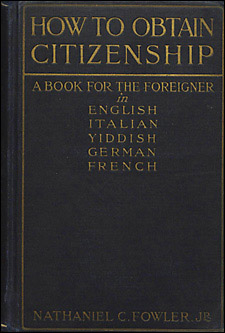Treasure of immigration archives on Web
New digital collection provides open, online access to thousands of items from Harvard libraries, archives, and museums

The Open Collections Program (OCP) of the Harvard University Library has launched “Immigration to the United States, 1789-1930,” a Web-based collection of selected historical materials from Harvard’s libraries, archives, and museums that documents voluntary immigration to the United States from the signing of the Constitution to the onset of the Great Depression.
The collection is funded by the William and Flora Hewlett Foundation as part of a burgeoning international movement to provide educational materials on the Internet that the foundation has helped to pioneer.
Concentrating heavily on the 19th century, “Immigration to the United States, 1789-1930,” includes approximately 1,800 books and pamphlets, 6,000 photographs, 200 maps, and 13,000 pages from manuscript and archival collections. By incorporating diaries, biographies, and other writings capturing diverse experiences, the collected material provides a window into the lives of ordinary immigrants.
“This is an extraordinarily valuable collection of material relating to immigration,” said Stephan Thernstrom, Winthrop Professor of History in the Faculty of Arts and Sciences. “Immigration has long been one of the central themes of American history, and its significance is newly evident today, with the rising tide of newcomers since the liberalization of our immigration law in 1965 again made the United States a nation of immigrants. The mass immigration of the past four decades cannot be understood without a firm grasp of the influxes of people in the late 19th and early 20th centuries. Harvard’s rich resources on this subject are now at the fingertips of any student – or faculty member – with a computer.”
In addition to thousands of items that are now accessible to any Internet user, the collection includes contextual information. The site also provides links to related digital resources that cover other aspects of immigration to the United States, including vital materials on the African diaspora.
“Immigration to the United States, 1789-1930” is part of Harvard’s Open Collections Program (visit http://ocp.hul.harvard.edu), through which the University advances teaching and learning on historical topics of great relevance by providing online access to historical resources from Harvard’s libraries, archives, and museums. OCP’s highly specialized “open collections” are developed through careful collaborations among faculty, librarians, and curators. The goal of the Open Collections Program is to offer a new model for digital collections that will benefit students and teachers around the world.

According to Sidney Verba, Carl H. Pforzheimer University Professor and director of the University Library, “The experience of working with this University’s historical materials has long been an irreplaceable part of a Harvard education. Now, by developing subject-based digital collections on topics of contemporary concern, Harvard is making that experience available to students and teachers everywhere.”
The libraries and museums of Harvard University provide open, online access to a rich array of digital materials, including photographic collections, documents, musical scores, prints, drawings, historical maps, books, legal transcripts, diaries, manuscripts, and more. To explore the growing number of subject-specific collections available online, visit http://digitalcollections.harvard.edu.
– Peter Kosewski, director of publications and communications at Harvard University Library




